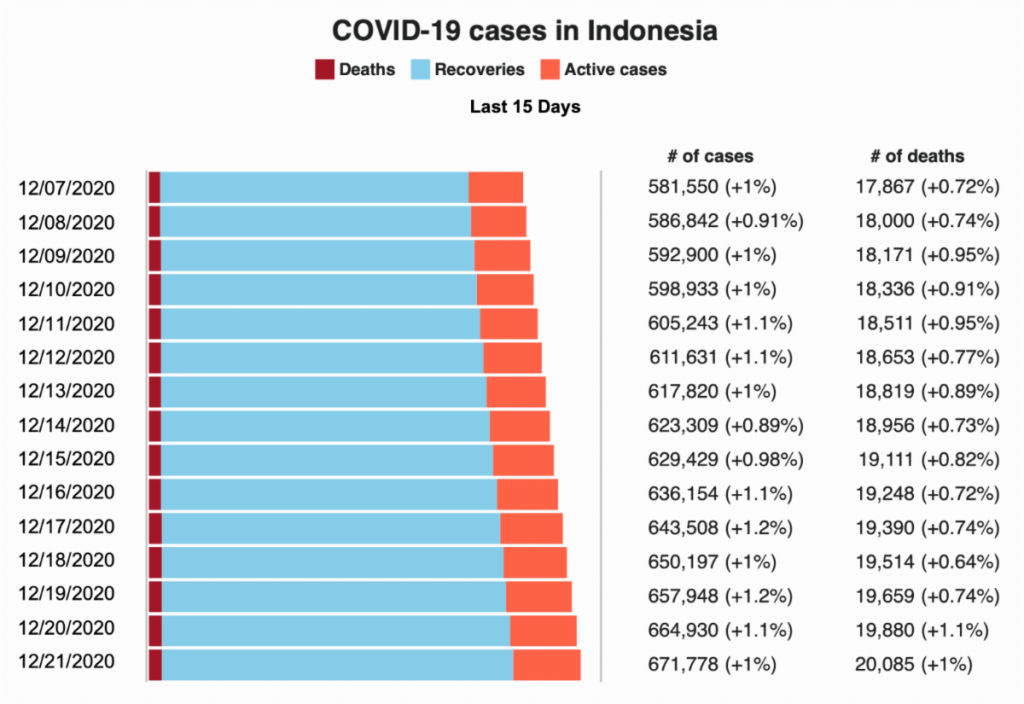Coronavirus Update #43 December 21, 2020
Cumulative number of reported cases: 671,778 (as of December 21)
Recovered: 546,884
Deaths: 20,084

Rupiah to US$14,154
Jakarta Stock Exchange Index: 6165
Overview- Free Vaccines
Nationwide case growth slowed from 17 to 11%, week-on-week but the national positivity remains a troubling 17%. Fatalities reached a new high on December 15.
President Joko Widodo announced on Wednesday (Dec 16) that he will be the first recipient of a Covid-19 vaccine in Indonesia and the vaccination will be available free to all Indonesians. The government expects to reallocate remaining COVID relief funds and alter its 2021 spending plan to accommodate the vaccination program.
Travel- Bali Requires Testing to Enter
Bali, hoping to capture end-of-the-year holiday visitors will require then to undergo testing prior to reaching the island. Visitors arriving by air must take PCR tests and those arriving by ferry must take rapid antigen tests. Jakarta’s governor, Anies Baswedan, announced that a similar antigen test requirement will apply to those arriving at Jakarta’s airports.
Economic-
- Revised Annual GDP Projection-Indonesia Finance Minister Sri Mulyani Indrawati revised the projection for Indonesia’s overall economic growth in 2020 to stay in a negative range, though the contraction is deeper, specifically minus 2.2% to minus 1.7%. “Indeed, this is slightly better than the average ASEAN or emerging market countries, but we are still vigilant,” the minister stated during a virtual press conference on Monday (12/21). This projection is line with the one Coordinating Economics Minister Airlangga Hartarto made last week.
- BI Rate Unchanged– Bank Indonesia (BI) kept its 7-day reverse repurchase policy rate at 3.75% on Thursday as widely expected by market analysts. After surprising investors at the November meeting, Governor Perry Warjiyo opted to pause and keep the bank’s powder dry for potential easing in 2021, retaining his accommodative stance given benign inflation (2.1% year-to-date average) and negative GDP. BI has cut policy rates by a cumulative 125 bps and only did so when the Indonesian rupiah displayed stability, which will remain a key decision variable for rate cuts in the future.
- Economic Partnership Agreement with Korea- Indonesia and South Korea signed on Friday (12/18) a comprehensive economic partnership agreement that is expected to boost the trade in goods and services, as well as investment, between the two countries. The Indonesia-Korea Comprehensive Economic Partnership Agreement (IK-CEPA) is seen as representing broader and deeper bilateral cooperation, after both countries participated in the signing of the mega Regional Comprehensive Economic Partnership (RCEP) trade deal on Nov. 15. According to Indonesia’s Trade Minister Agus Suparmanto, the deal will help Indonesia become a production hub and make its economy stronger, more competitive, and attractive for South Korean investors.
- World Bank Report- The bank’s periodic report on the Indonesian economy praised the government’s forceful response to the pandemic but noted the extreme pressures on the banking system.





